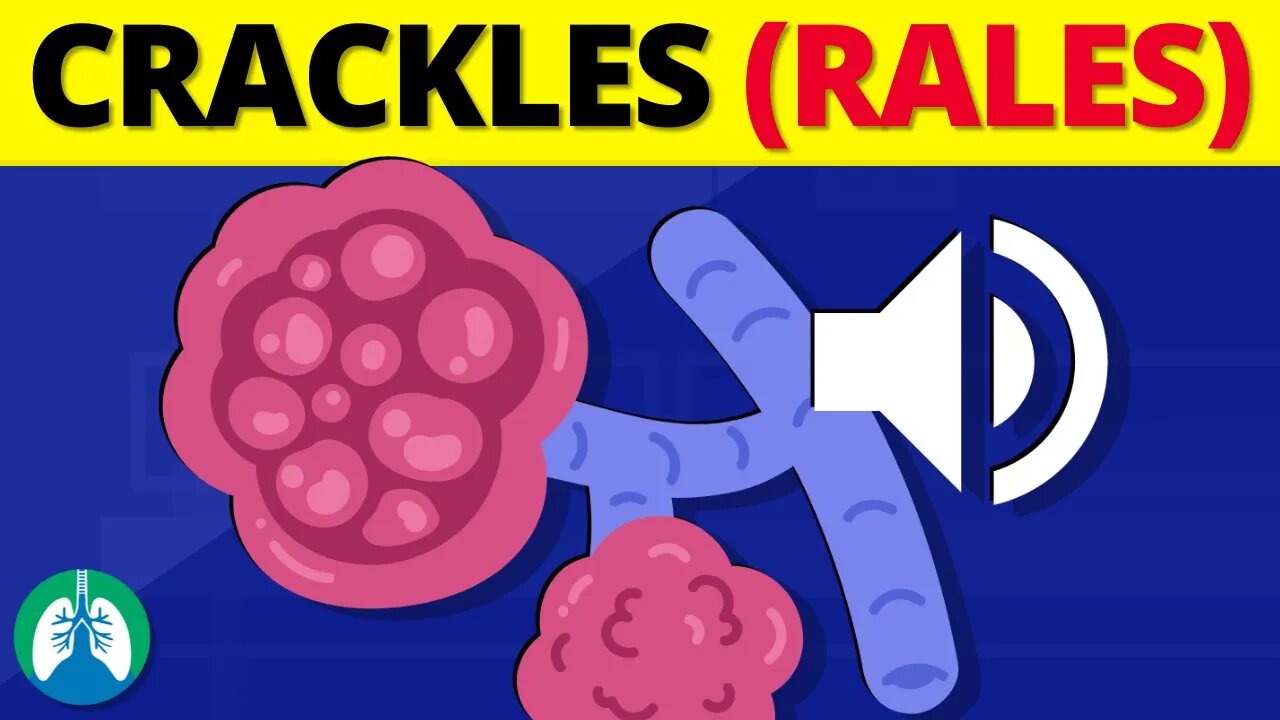Premium Only Content

Crackles (Rales) | Medical Definition and Explanation 🔊
What causes crackles (rales)? When is this type of lung sound heard? This video covers the medical definition and provides a brief overview of this topic.
💥Lung Sounds [Full Guide] ➜ ➜ ➜ http://bit.ly/2Vjd2Nr
➡️ Auscultation
Auscultation is the process of using a stethoscope to listen to the sounds within the lungs. When crackles are heard during auscultation, they are typically associated with the presence of fluid or secretions in the airways. Crackles can occur during both inspiration and expiration but are more common during the inspiratory phase of breathing.
➡️ Types
- Fine crackles
- Coarse crackles
➡️ Fine crackles indicate that fluid is in the smaller airways. They have a higher frequency and a shorter duration. These are often heard in patients with congestive heart failure (CHF) and pulmonary edema. They can be treated with diuretic medications, such as Lasix.
➡️ Coarse crackles are lower in pitch and longer in duration. They are caused by secretions in the larger airways. This type is often referred to as rhonchi, which is an abnormal breath sound that can be heard when air moves through larger airways that have accumulated mucus or secretions. Coarse crackles are typically heard during the expiratory phase of breathing. They can be treated with airway suctioning or bronchial hygiene therapy.
➡️ Other Types
Bilateral crackles – sounds that are heard in both lungs
Basal crackles – sounds that are heard in the base of a lung
Bibasal crackles – basal crackles that can be heard in both lungs
➡️ Causes
- Pulmonary edema
- Congestive heart failure (CHF)
- Pneumonia
- Atelectasis
- Pulmonary fibrosis
- Acute bronchitis
- Bronchiectasis
- Acute respiratory distress syndrome (ARDS)
- Interstitial lung disease
Crackles that do not clear after the patient coughs are usually associated with pulmonary edema or fluid in the alveoli due to congestive heart failure.
💥Lung Sounds [Full Guide] ➜ ➜ ➜ http://bit.ly/2Vjd2Nr
—————
📗 BEST STUDY GUIDES FOR YOU
▪ TMC Test Bank 👉 http://bit.ly/2IGeqSu
▪ Hacking the TMC Exam 👉 http://bit.ly/2XBc8do
▪ TMC Exam Bundle (Save $) 👉 https://bit.ly/34pqEsV
▪ Daily TMC Practice Questions 👉 http://bit.ly/2NnXh3C
💙MORE FROM RTZ
▪ Free TMC Practice Exam 👉 http://bit.ly/2XlwASL
▪ Free RRT Cheat Sheet 👉 http://bit.ly/2IbmOKB
▪ Resources for RT's 👉 http://bit.ly/2WVV5qo
▪ Testimonials 👉 http://bit.ly/2x7b5Gl
🌐FOLLOW US
▪ Instagram 👉 http://bit.ly/2FhF0jV
▪ Twitter 👉 http://bit.ly/2ZsS6T1
▪ Facebook 👉 http://bit.ly/2MSEejt
▪ Pinterest 👉 http://bit.ly/2ZwVLPw
🚑MEDICAL DISCLAIMER
This content is for educational and informational purposes only. It is not intended to be a substitute for professional medical advice, diagnosis, or treatment. Please consult with a physician with any questions that you may have regarding a medical condition. Never disregard professional medical advice or delay in seeking it because of something you watch in this video. We strive for 100% accuracy, but errors may occur, and medications, protocols, and treatment methods may change over time.
💡AFFILIATE DISCLAIMER
This description contains affiliate links. If you decide to purchase a product through one of them, we receive a small commission at no cost to you.
—————
⏰TIMESTAMPS
0:00 - Intro
0:19 - Auscultation
0:40 - Types
0:46 - Fine Crackles
1:04 - Coarse Crackles
1:36 - Other Types
1:57 - Causes
—————
🖼CREDIT FOR MUSIC AND GRAPHICS:
▪ Music licensed from Audiojungle.net/
▪ Graphics: Canva.com, Freevector.com, Vecteezy.com, and Pngtree.com
#RespiratoryTherapy #Crackles #LungSounds
-
 4:01
4:01
Respiratory Therapy Zone
1 year agoLung Lobes and Fissures *EXPLAINED* 🫁
417 -
 16:42
16:42
Dr. Nick Zyrowski
21 days agoFasting Is THE Cure - NO FOOD FOR 7 DAYS Heals Everything!
13.6K11 -
 1:10:44
1:10:44
Savanah Hernandez
7 hours agoThe GOP Sucks So Bad They Demoralized The Most Energetic Pro-America Fighter We Have
137K79 -
 3:03:55
3:03:55
TimcastIRL
6 hours agoFBI To Release Of EPSTEIN PRISON Tapes They Say PROVES He UNALIVED Himself | Timcast IRL
226K185 -
 2:49:00
2:49:00
Laura Loomer
6 hours agoEP124: They're Saving The Dogs! They're Saving The Cats!
38.7K11 -
 1:21:23
1:21:23
T-SPLY
5 hours agoDemocrat Mayor Of Nashville Caught Doxing Ice Agents!
39.5K13 -
 3:16:25
3:16:25
Barry Cunningham
8 hours agoPRESIDENT TRUMP: NOTHING CAN STOP WHAT IS COMING! ARE YOU READY?
88.9K57 -
 13:06
13:06
Colion Noir
8 hours agoOpen Carrier Killed With His Own Gun At Autozone | Open Carry Gone Wrong
66.4K37 -
 57:09
57:09
Kitco NEWS
12 hours agoFiat Collapse Ahead Gold to $8,900 in Global Monetary Shift
31.7K4 -
 16:46
16:46
Nick Shirley
14 hours ago $1.88 earnedAsking Democrats About the Joe Biden Cover Up Scam
32.7K17